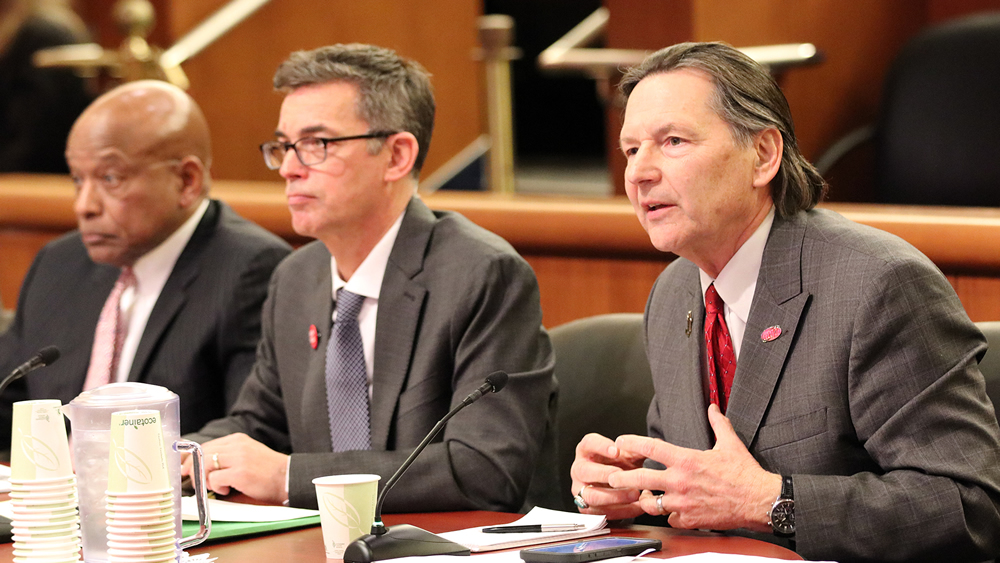February 9, 2024

UUP President Fred Kowal lashed out at SUNY over its plan to close SUNY Downstate University Hospital during testimony at a state hearing on higher education Feb. 8.
Kowal, testifying before the state Senate Finance and Assembly Ways and Means committees, called the closure plan a disaster that “will bring harm to the health of the Central Brooklyn community.” The plan, which Kowal said was drafted in secrecy by SUNY, was announced without any community input.
He slammed SUNY over the timing of its Feb. 7 announcement to hold five “themed” public forums to solicit public comment—which comes weeks after the closure plan was announced.
“SUNY drafted its plan to close Downstate’s hospital in secrecy and was happy to move forward without involving the community in any way, shape or form,” said Kowal. “This is a complete scam. It’s nothing more than smoke and mirrors, a disingenuous move to make the community believe they will actually have a say in what happens to this hospital.”
“If SUNY really cared about what the community thinks, they would have engaged with stakeholders six months ago when the plan to close Downstate was being developed,” Kowal said. “Scheduling a handful of focus groups now smacks of desperation and pushes the limits of insincerity. It displays arrogance and total disrespect to the people of Brooklyn.”
Under SUNY’s closure plan, many of Downstate University Hospital’s health care services would be farmed out to neighboring hospitals. Those remaining would be consolidated into a wing at Kings County Hospital Center.
The Central Brooklyn community relies on Downstate’s hospital for care. More than 300,000 patients are treated there each year and the vast majority of them—nearly 90%—are on Medicaid, are underinsured or have no health insurance. It ranks No. 1 out of all 143 hospitals in New York state as a percent of its revenue from Medicaid, meaning the most vulnerable and underserved populations would be impacted most by its closure.
Several state lawmakers, including Sen. Robert Johnson, Sen. Lea Webb, Assemblymember Monica Wallace and Assemblymember Monique Chandler-Waterman all expressed strong support to keep Downstate open.
“My community members are very worried about Downstate,” said Chandler-Waterman, who represents the 58th Assembly District in East Flatbush—which is adjacent to the Downstate campus. “They do not agree with this plan and I stand with my community.”
King hammered over Downstate
King, who testified earlier in the meeting, was grilled by state lawmakers over SUNY’s plan to close Downstate.
Lawmakers questioned King about discussions and actions that led to the decision—including budget cuts to the SUNY hospitals—along with likely job losses and the effect on the community if the hospital closes.
“This, I must tell you, is a great concern to me, but also to the legislators who represent the central Brooklyn area, and even most importantly to the people who use this facility for their health care,” said Sen. Toby Ann Stavisky, chair of the Senate Committee on Higher Education.
While King tried to make it clear that his goal is to save Downstate, Sen. Gustavo Rivera was unsatisfied with King’s responses.
“There was a series of questions that Senator Stavisky asked about a Certificate of Need and also a health equity impact assessment,” Rivera said. ”Both of those questions, you really did not answer them well.”
He and several other legislators asked King if SUNY was planning to ask the state Department of Health for a Certificate of Need before proceeding with its plan for Downstate. After attempting to dodge the questions, King said that the certificate was something being discussed but did not elaborate.
A Certificate of Need governs the establishment, construction, renovation and major medical equipment acquisitions of health care facilities, such as hospitals, nursing homes, home care agencies, and diagnostic and treatment centers.
In response to Rivera, King stated that “our goal is to protect the Health Sciences University and preserve and expand on services in that community.” However, King laid out no clear plan to achieve this.

